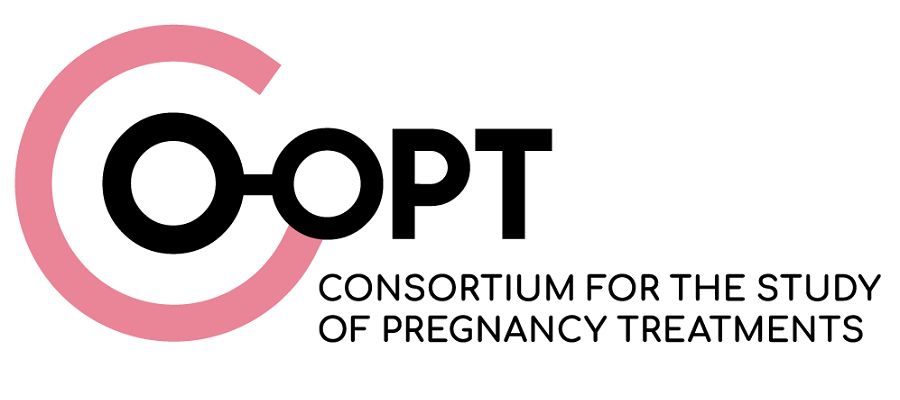
Summary (Research in a nutshell)
50% of pregnant women are prescribed drugs in pregnancy, but there are significant knowledge gaps about the safety, optimum dosage and long-term effects of medications in pregnancy.
We have formed the Consortium for the Study of Pregnancy Treatments (Co_OPT) collaboration with cross-disciplinary expertise, to investigate the effects of treatments given in pregnancy. Co_OPT will address knowledge gaps through individual patient data level meta-analysis and data linkage studies with data extracted from electronic health records and contributed from birth registries, cohort studies and RCTs. We anticipate that the methods developed will serve as a platform for future studies of other preterm birth treatments and other medications used in pregnancy.
The initial focus of Co_OPT will be on antenatal corticosteroid treatment (ACT). The overall aim of the initial study, which will analyse data from Scottish Health Records in combination with anonymised routinely collected and observational data from a number of different sources (birth registries from other countries; data from observational cohort studies), is to undertake a robust evaluation of the short-term and long-term benefits and harms of antenatal corticosteroids given to mothers at risk of preterm birth, to determine to whom antenatal corticosteroids should be offered, and in what form. This will contribute to improving the health of pregnant women and their babies.
The primary objective is to determine the safety of ACT in women and babies who are treated unnecessarily (deliver at term) or who receive inappropriately timed ACT (deliver >7 days after administration, when benefits are minimal) or questionably appropriate ACT (receive ACT >36 weeks gestation to cover early term birth, where there is less clear evidence of benefit).
The secondary objective is to determine characteristics that influence maternal and infant outcomes following ACT, develop predictive models for their use and determine best formulation and dose regimens.
The principal research questions we will address are:
- What is the incidence of ACT that is a) inappropriately timed (defined as birth > seven days after administration of ACT), b) unnecessary (defined as preterm administration of ACT but birth >36 completed weeks of gestation) and c) given at early term or term gestations (defined as given >36 weeks gestation)?
- Does inappropriately timed and/or unnecessary or early term ACT increase perinatal morbidity and/or mortality?
- What are the effects of ACT on maternal morbidity?
- What is the effect of ACT on childhood neurodevelopment and health?
- How do pregnancy characteristics (e.g. gestation at administration or birth, multiple gestation, growth restriction, chorioamnionitis, other treatments) influence outcomes following ACT?
- Do different dose schedule and formulation of ACT affect outcomes?
This work will be complimented by a separate, but related systematic review and IPD meta-analysis of RCT data from trials of ACT.
Key people
| Name | Role |
|---|---|
| Dr Sarah Stock | Chief Investigator |
| Chun Lin | Data Analyst |
| Emily Frier | Clinical Research Fellow |
Contact
Dr Sarah Stock: sarah.stock@ed.ac.uk
Key publications
- Kemp MW, Jobe AH, Usuda H, Nathanielsz PW, Li C, Kuo A, Huber HF, Clarke GD, Saito M, Newnham JP, Stock SJ. Efficacy and Safety of Antenatal Steroids. Am J Physiol Regul Integr Comp Physiol. 2018 Apr 11. doi: 10.1152/ajpregu.00193.2017.
- Agnew EJ, Ivy JR, Stock SJ, Chapman KE. Glucocorticoids, antenatal corticosteroid therapy and fetal heart maturation. J Mol Endocrinol. 2018 Jul;61(1):R61-R73. doi: 10.1530/JME-18-0077. Epub 2018 May 2.
- Kemp MW, Newnham JP, Challis JG, Jobe AH, Stock SJ. The clinical use of corticosteroids in pregnancy. Hum Reprod Update. 2015 Nov 20. doi: 10.1093/humupd/dmv047
- Stock SJ and Norman JE. Medicines in pregnancy [version 1; peer review: 3 approved]. F1000Research 2019, 8(F1000 Faculty Rev):911 doi: 10.12688/f1000research.17535.1
Key Collaborations
Professor K Allergaert (KU Leuven, Belgium)
Associate Professor C Bannerman-Gyamfi (Columbia University, USA)
Dr Jasper Been (Erasmus MC, Netherlands)
Dr S Bhattacharya (University of Aberdeen, UK)
Associate Professor K Einarsdottir (Centre for Health Sciences, University of Iceland)
Dr Abigail Fraser (University of Bristol, UK)
Professor M Gissler (National Institute of Health and Welfare, Finland)
Professor Lani Florian (University of Edinburgh, UK)
Professor B Jacobsson (Sahlgrenska Academy, University of Gothenburg, Sweden)
Professor S Kuhle (Dalhousie University, Canada)
Professor B Mol (University of Adelaide, Australia)
Dr Sarah Murray (University of Edinburgh)
Professor Jane Norman (University of Bristol, UK)
Associate Professor L Pedersen (Aarhus University, Denmark)
Professor R Reynolds (University of Edinburgh, UK)
Professor R Riley (University of Keele, UK)
Dr D Roberts (Liverpool Women's Hospital, UK)
Assistant Professor E Schuit (UMC Utrecht, the Netherlands)
Professor Aziz Sheikh (University of Edinburgh, UK)
Dr J Vogel (Maternal and Perinatal Health, WHO)
Dr Rachael Wood (University of Edinburgh, UK)
Professor J Wright (Bradford Institute for Health Research, UK)
Professor Helga Zoega (Centre for Big Data Research in Health, UNSW Australia)
Dr Eyal Krispin (Tel Aviv University, Israel)
Dr Ting Shi (University of Edinburgh)
Dr Christy Woolcott (Dalhousie University, Nova Scotia)
Dr Kate Duhig (King’s College London)
Professor Ashraf Nabhan (Ain Shams University, Egypt)
Dr Jeeva John (University of Edniburgh)
Partners and Funders
European Foundation for the Care of Newborn Infants
Timeline
June 2018 - May 2023
Scientific themes
Pregnancy, Antenatal corticosteroids, Medicines, Preterm, Stillbirth, Perinatal Mortality, Neurodevelopment
Methodology keywords
Natural Language Processing, Individual Patient Data Level Meta-analysis (IPD meta-analysis), Predictive models, Cohort

